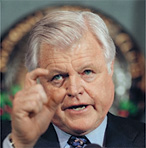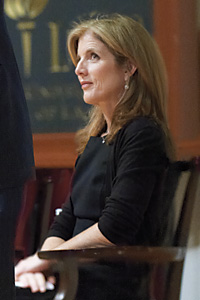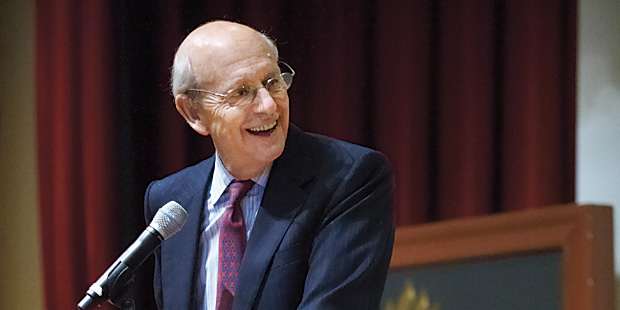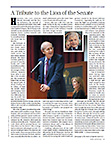A Tribute to the Lion of the Senate
Printer Friendly Version Honoring the late senator Edward Kennedy and his lasting influence, the Journal of Legislation and Public Policy held a symposium and dedicated a special issue to his legislative legacy. The February event included warm remembrances by Justice Stephen Breyer, Caroline Kennedy, and Kenneth Feinberg ’70, as well as others who knew him for decades.
Honoring the late senator Edward Kennedy and his lasting influence, the Journal of Legislation and Public Policy held a symposium and dedicated a special issue to his legislative legacy. The February event included warm remembrances by Justice Stephen Breyer, Caroline Kennedy, and Kenneth Feinberg ’70, as well as others who knew him for decades.
 The hallmark of Ted Kennedy’s 47-year Senate career was his inclusiveness and ability to reach across the aisle to find common ground. His niece Caroline painted a portrait of how his family and childhood influenced this characteristic. As the youngest of nine children, Kennedy knew what it was like to be crowded out. This sensitivity “helped him develop his special gifts of always looking out for others, of making people laugh, and bringing them together no matter how differently they saw the world,” she said. “He saw the law as an instrument of social change, not in the abstract but in its effect on the everyday lives of those who were left out or left behind and needed his help.”
The hallmark of Ted Kennedy’s 47-year Senate career was his inclusiveness and ability to reach across the aisle to find common ground. His niece Caroline painted a portrait of how his family and childhood influenced this characteristic. As the youngest of nine children, Kennedy knew what it was like to be crowded out. This sensitivity “helped him develop his special gifts of always looking out for others, of making people laugh, and bringing them together no matter how differently they saw the world,” she said. “He saw the law as an instrument of social change, not in the abstract but in its effect on the everyday lives of those who were left out or left behind and needed his help.”
The other speakers described his political acumen and boundless energy. Thomas Susman, who was assistant adviser to Kennedy and then general counsel on the Senate Judiciary Committee from 1968 to 1979, summed up the senator’s philosophy in reaching across the aisle: “Persuade, don’t trade. Don’t ask for personal favors. Get them there on the merits.” This strategy had its defensive advantages as well. If a senator would give him a vote that was not on the merits, there was a good chance that that senator would want one back, said Susman. Kennedy didn’t do that, he added—no small achievement given the more than 15,000 Senate votes Kennedy cast.
Breyer, who met with NYU Law students earlier in the day, recalled Kennedy’s vigor. Kennedy had appointed Breyer special counsel to the Judiciary Committee; later, Breyer became chief counsel. “We used to just wake up in the morning and try to get to work fast, because every minute, there was something going on,” the justice said. “Kennedy’s personality just gripped the whole thing.”
Recently, the current Republican chairman of the House Judiciary Committee asked Breyer to speak to its members. To Breyer’s surprise, Lamar Smith wanted to know how Kennedy had run the Senate Judiciary Committee. This request was a testament, Breyer said, to the efficacy of Kennedy’s bipartisanship.
Feinberg, administrator of the Gulf Coast Claims Facility, compensating those affected by the BP Deepwater Horizon oil spill, worked for Kennedy from 1975 to 1980, eventually becoming his chief of staff and general counsel to the Senate Judiciary Committee. Appearing by webcam because his flight was grounded, Feinberg characterized Kennedy as one of very few senators in modern times with “the political and institutional credibility to legislate” and achieve true partnership with members of the opposing party. The late senator worked tirelessly and went to great lengths to foster personal relationships with everyone in his orbit, Feinberg said. “He was constantly working from early in the morning till late at night, seven days a week, in order to achieve the endgame. He was driven by his name, by the history of his family, by the reputation he was determined to vindicate.”
One of Kennedy’s most lasting legacies, said Nick Littlefield, who worked as a staff director and chief counsel for Kennedy on the Senate Committee on Health, Education, Labor and Pensions, would be universal health care, an issue on which Kennedy worked hard throughout his career.
Although the health-care bill did not pass until after Kennedy’s death, Littlefield asserted that the senator “had a key role through the moral force of his personality, through his strategic sense, through being there for key votes, through talking to Obama, through the letters he wrote to Obama, through the speeches he gave. In many ways, universal health care in America is the great Kennedy legacy.” That something as basic as health care was so important to Kennedy affirms what Caroline Kennedy said about him: “More than almost anyone else I’ve ever met, Teddy’s humanity is what made him such a legislative giant.”
—


 Multimedia
Multimedia